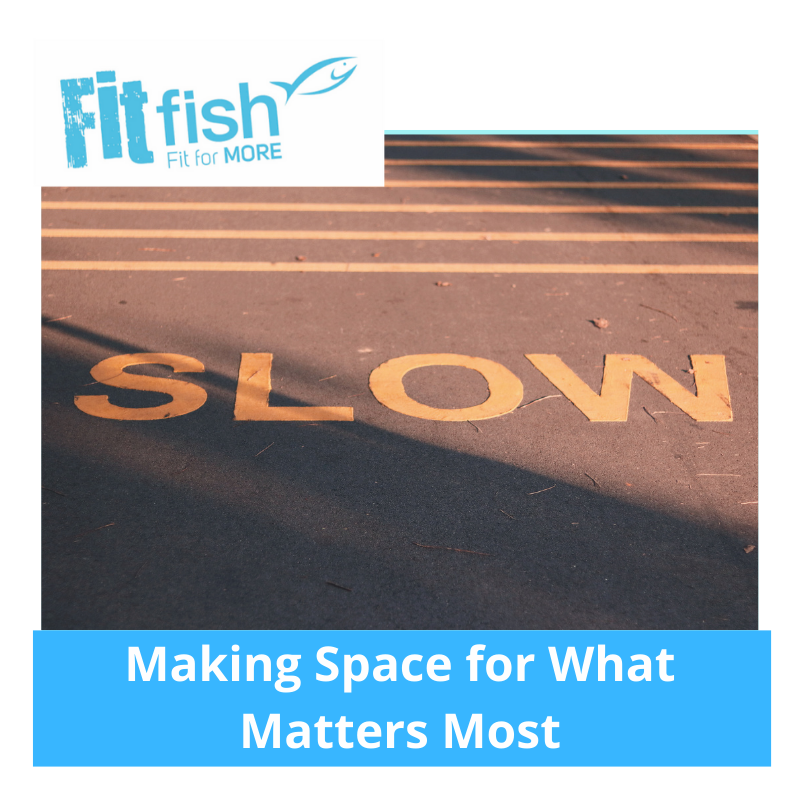Making Space for What Matters Most

Fitfish recently hosted an evening online with Cathy Madavan, an author with over 30 years of experience in church leadership, who understands the complexities of life and the challenges we all face. Sharing some insights from her latest book, ‘Why Less Means More: Making Space for What Matters Most’, Cathy talked about how society bombards us with the idea that more is the answer to all our questions—more money, more success, more possessions. But she also reminded us that these external metrics are not the biblical principles by which God measures success. Instead, righteousness, relationships, unity, knowing God, and loving others are the true indicators of success. In this blog post, we share some of Cathy’s insights on the importance of finding balance in our lives, and why less can mean more!
The Undisciplined Pursuit of More: Richard Foster is a renowned writer and spiritual author, who, in his classic works on spiritual discipline, explores the undisciplined pursuit of more that resides within each of us. It is an innate tendency to constantly seek accumulation without letting go. Cathy is the first to admit to her own inclination to add things to her life, say “yes” when people ask her to take on new things, and indulge in acquiring lovely new possessions. However, she also recognises the importance of releasing burdens and decluttering our lives. The accumulation mindset comes at a cost, impacting our well-being and adding to the stress epidemic in our society.
The Stress Epidemic: Recent surveys on stress conducted by a prominent management consultancy firm reveal some alarming statistics—77% of people in the workforce feel they are on the verge of burnout, 25% of individuals surveyed didn’t take their annual leave due to work pressures, and 80% of them reported that stress was negatively affecting their personal relationships. Chronic stress has become the norm, leaving individuals with limited mental and emotional capacity to consider positive changes in their lives. Cathy reminds us that we are not Wonder Woman, and it is so important we recognise our thresholds and our limits.
Recognising Personal Limits: Each of us has physical limits that are more tangible, such as strength or endurance. But we also have emotional, spiritual, and mental limits that are less tangible but equally significant. Recognising the signs when under pressure and nearing these limits becomes essential for overall well-being. As individuals, we need to be mindful of the indicators—snapping at loved ones, forgetfulness, or a lack of joy. By understanding these signs, each of us can take appropriate action to prevent overwhelm and maintain a healthy balance.
Seeking Less and More: To recalibrate and restore balance in life, it is important to determine what areas require less and what areas require more. In her talk, Cathy posed a question to the audience—what would you like less of in your lives? Answers included social media, household chores, work deadlines, or physical pain. And while some of these stressors can be minimised or delegated, we also need to recognise that certain seasons of life may naturally be more demanding, requiring us to extend grace to ourselves and make choices reflecting our limitations. It is essential to recognise that it is impossible to do everything all the time.
Re-evaluating our Relationship with Time: God has given us time as a gift. Ecclesiastes 3:1-18 reminds us there is a time for everything that God wants us to do, and he has given us time to do it. Cathy openly admits her own natural optimism when it comes to estimating what can be accomplished within a given timeframe. But she has also come to realise that time can’t be stretched, it can only be spent. Theologian John Swinton’s book ‘Becoming Friends with Time’ examines humanity’s historical relationship with time, revealing how efficiency and advancements intended to provide more time have instead led to increased expectations of productivity. We are encouraged to develop a healthier relationship with time, to avoid perpetual busyness, and create space for rest, reflection, and connection.
Three Mile an Hour God: Reflecting on the pace at which individuals live their lives, Cathy also draws inspiration from another theologian, Kosuke Koyama, author of “Three mile an Hour God.” This book reflects on the fact that Jesus, the embodiment of love and compassion, walked with people at a pace of three miles an hour. This significantly slower pace contrasts with the rapid pace demanded by today’s technologically driven world. God’s love has its own speed—a gentle, deliberate pace that allows for true experiences and meaningful connections. So often we are rushing round at what feels like a thousand miles an hour, but we would do well to recognise the importance of embracing the slower pace of love.
In a world fixated on the pursuit of “more,” Cathy emphasises the countercultural act of finding balance and simplicity. Understanding personal limits, re-evaluating our relationship with time, and embracing a slower pace are key steps toward recalibrating and realigning our lives. Success is not measured by busyness or accomplishments within a specific timeframe. Instead, true success lies in righteousness, relationships, unity, and love. We are encouraged to reflect on our current season and discern the Father’s business for us right now. By embracing simplicity, finding balance, and aligning with the pace of love, we can navigate life’s complexities with grace and purpose.
Our next Saturday morning Reflection, Coffee and Conversations is ready to book here: events page
Comments
Add comment